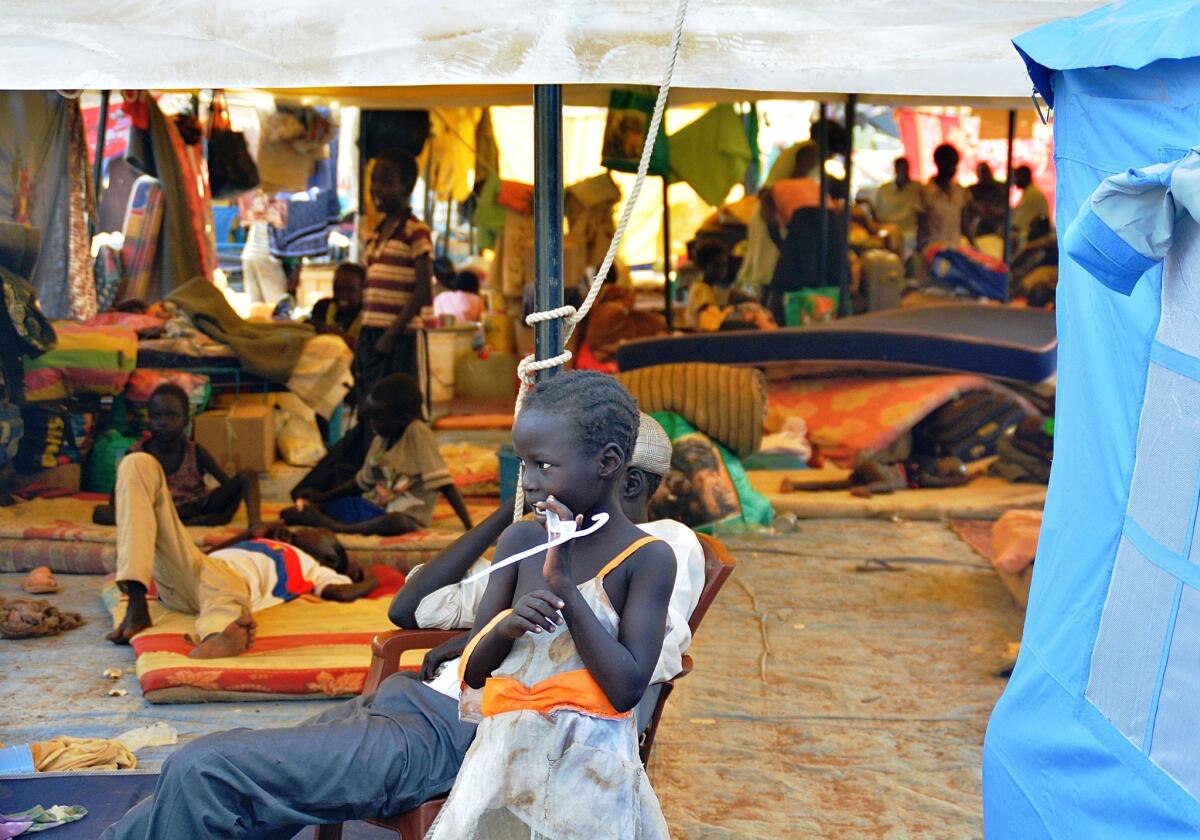South Sudan peace negotiations stall over agenda

- Share via
PRETORIA, South Africa — Face-to-face peace talks between warring parties in South Sudan were stalled Saturday, government officials and rebel delegations said, dashing hopes of a swift end to the bloodshed.
Representatives of President Salva Kiir’s government and rebels loyal to his former vice president, Riek Machar, began preliminary negotiations through mediators in neighboring Ethiopia on Friday. The talks are seen as a step toward ending the violence that has killed at least 1,000 people, driven tens of thousands from their homes and threatens to plunge the world’s newest country into civil war.
But a cease-fire appeared to be a long way off Saturday as government and rebel delegations in Addis Ababa, the capital of Ethiopia, reported that direct talks in the Sheraton Hotel had been delayed as the two parties work through the mediators to set a negotiating agenda.
The negotiating teams were “waiting to hear the way forward,” said South Sudan Information Minister Michael Makuei, Agence France-Presse news agency reported Saturday. Rebel spokesman Yohanis Musa Pouk said: “The heads of the two delegations need to agree on an agenda ... maybe tomorrow or after tomorrow.”
“They are still working on formalizing the agenda that they will hold discussions on,” Dina Mufti, spokesman for Ethiopia’s Foreign Ministry, told Reuters news service. There was no indication when face-to-face talks would begin.
Fighting erupted Dec. 15 between army units loyal to Kiir and a coalition of mutinous military forces believed to be headed by Machar. Kiir is from the country’s Dinka group while Machar is a Nuer, splitting the country down ethnic lines.
At least 194,000 people have been displaced since fighting broke out, according to the United Nations. About 57,500 people are seeking refuge inside U.N. bases. Reports from Bor, a town where heavy fighting has taken place, indicate that “water, food and sanitation are at critically low levels, with tension high among civilians who are hungry and fear disease outbreaks,” the U.N. said in a report released Wednesday.
In response to the “deteriorating security situation,” the U.S. on Friday ordered more of its staff to evacuate the country, which won its independence from Sudan two years ago in a peace deal brokered in part by the United States, ending one of Africa’s longest civil wars.
More than 440 U.S. officials and private citizens have been evacuated from South Sudan, State Department spokeswoman Marie Harf said in Washington on Friday. The Pentagon sent two KC-130 aircraft to pick up about 20 U.S. diplomatic staff from the embassy in Juba, the capital, Army Col. Steve Warren said.
The U.S. also announced an additional $49.8 million in assistance to help address the humanitarian crisis, Harf said in a statement.
South Sudan’s government Wednesday declared a state of emergency in Unity and Jonglei states, where the rebel-held towns of Bentiu and Bor are located. Early this week the government warned that rebels affiliated with Machar — dubbed the “White Army” after the white ash they dust on their faces for insect repellent — were preparing to march to Juba from Jonglei, which has been the scene of fierce fighting. Still, the government maintains Juba is secure.
Kiir and Machar, now a fugitive sought by the South Sudan military, said on Tuesday they would send delegations to Ethiopia, home of the African Union, for peace talks.
The sustained fighting has cut South Sudan’s oil output and added further instability to an already fragile region.
Findlay is a special correspondent.
More to Read
Sign up for Essential California
The most important California stories and recommendations in your inbox every morning.
You may occasionally receive promotional content from the Los Angeles Times.










